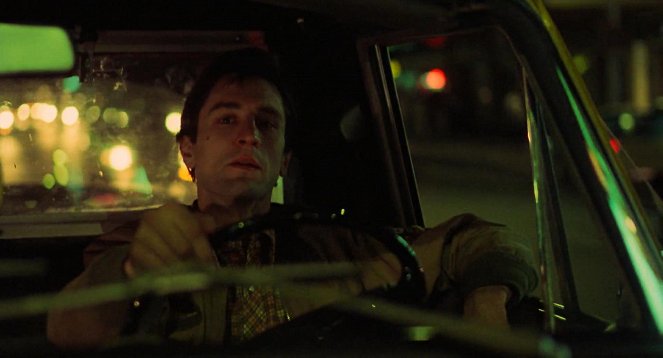Directed by:
Martin ScorseseScreenplay:
Paul SchraderCinematography:
Michael ChapmanComposer:
Bernard HerrmannCast:
Robert De Niro, Jodie Foster, Albert Brooks, Harvey Keitel, Leonard Harris, Peter Boyle, Cybill Shepherd, Diahnne Abbott, Frank Adu, Victor Argo (more)VOD (4)
Plots(1)
Robert De Niro and Jodie Foster star in this highly regarded classic from director Martin Scorsese about a mentally unstable Vietnam War veteran who works as a night-time taxi driver in New York City where the perceived decadence and sleaze feeds his urge for violent action, attempting to save a preadolescent prostitute in the process. (Sony Pictures UK)
(more)Reviews (12)
The dollar may have had significantly more power in the mid-70s than it does today, but the fact remains that the movie only cost a mere 1.9 million, which is unbelievable. Nevertheless, money for the project was hard to come by, and it took a long 3 years for Scorsese and De Niro to make it happen. The screenwriter used a real-life successful assassination attempt on presidential candidate George Wallace in 1972. However, the film is not a crime story in the ordinary sense; rather, it is a psychological drama about a Vietnam War veteran who cannot readjust to society upon his return home. Gradually, he becomes the opposite of Jack, the founder of the Fight Club in Fincher's famous film. Jack embodied the dissatisfaction of the radical urban intellectual left and the idea of an anarchist rebellion against the system. On the other hand, Travis is closer to the positions of the radical right; he watches with concern and increasing contempt as life unfolds in a decadent metropolis full of loose sexual morality, crime, and existential insecurity. Both anti-heroes share not only chronic insomnia but also a protest against the world they want to rid of falsehoods. If Travis had carried out his plan to the end, he would have been seen as the archetype villain by the public. However, Scorsese allows his character to live on and even makes him famous in the eyes of the public. Ironically, he thus caricatures the double morality of bourgeois society. Travis' multiple murder of members of the urban gallery turns him not into a terrorist but into a courageous fighter against the underworld. Even members of the liberal urban elite are not spared. The activist Betsy represents the epitome of a snob, and presidential candidate Palantine is a typical example of a professional chatterbox who speaks in vague phrases. Scorsese benefited greatly from not taking a clear activist stance. During its creation, Taxi Driver sparked numerous controversies and passions. In a few years, it became a cult film, and rightly so, unlike many other works. It has definitely not aged; the character of Travis Bickle still unsettles viewers to this day. From my perspective, it is Robert De Niro's most significant role. A bonus for today's viewers is the fact that the supporting actors grew into first-class stars over the following decades. Overall impression: 95%.
()
I waited twenty years to see one of Martin Scorsese’s most famous movies on the big screen in a festival atmosphere. It finally happened, moreover with a freshly restored version released by the restorers themselves. And nothing happened – at most, Taxi Driver is a valuable testimony of the period, place and mood of 1970s New York, which gives it historical significance (I’ve recently praised similar qualities in Sidney Lumet’s Serpico). The innovative and creative camerawork and Bernard Herrmann’s dark music are also excellent. However, the screenplay and its treatment of the protagonist are cold and aloof and take too many shortcuts, and the climax looks almost absurd, in a cartoonish fashion, as though it was a dramaturgically botched attempt at editing a more concise and epic work.
()
Quite shabby and very much “about nothing”. I don’t see anything exceptional about Taxi Driver. De Niro acts like in every film – almost all his roles are the same to me – and I still can’t bring myself to like Scorsese. It’s a shame, but I’ve already come to terms with the fact that the best works of these two gentlemen will never say much to me.
()
Taxi Driver is the third best film made by Scorsese and De Niro after Raging Bull and Wise Guys. But of all the above, it has by far the best music - Herrmann's ending to his career is divine. How a few notes can capture not only the environment in which the film takes place, but also the mental turmoil of the main character... It's breathtaking. You see the opening credits (which Richard Donner pays homage to in Gibson's Ransom) and you know - this is going to be SOMETHING. And it is.
()
I wouldn't be afraid to call those moments in which Robert De Niro drives through New York City at night as a taxi driver something magical. I've known about this movie for a long time, of course, but with such an iconic thing it's almost mandatory to see it on a proper screen with proper sound, so I just waited. The magic is in the sensual atmospherics, the excellent cinematography, and the perfectly fitting Herrmann soundtrack. Plus, the way Martin Scorsese "manages" it all is fantastic – there are a thousand other movies being made in New York, but Taxi Driver captures the Big Apple vibe in just the right way. All the nooks and crannies, the dirty streets, the creatures you would prefer never to meet, and the contrast with its pomposity – the beautiful buildings, the charming lights, just the spirit of the big city with all that goes with it. I don't think it's a film with extraordinary overtones or even deep philosophical undertones.) The whole film can be summed up as a dirty, gritty, and unadorned portrait of New York, one of the many excellent collaborations of the Scorsese-De Niro duo.
()


Ads